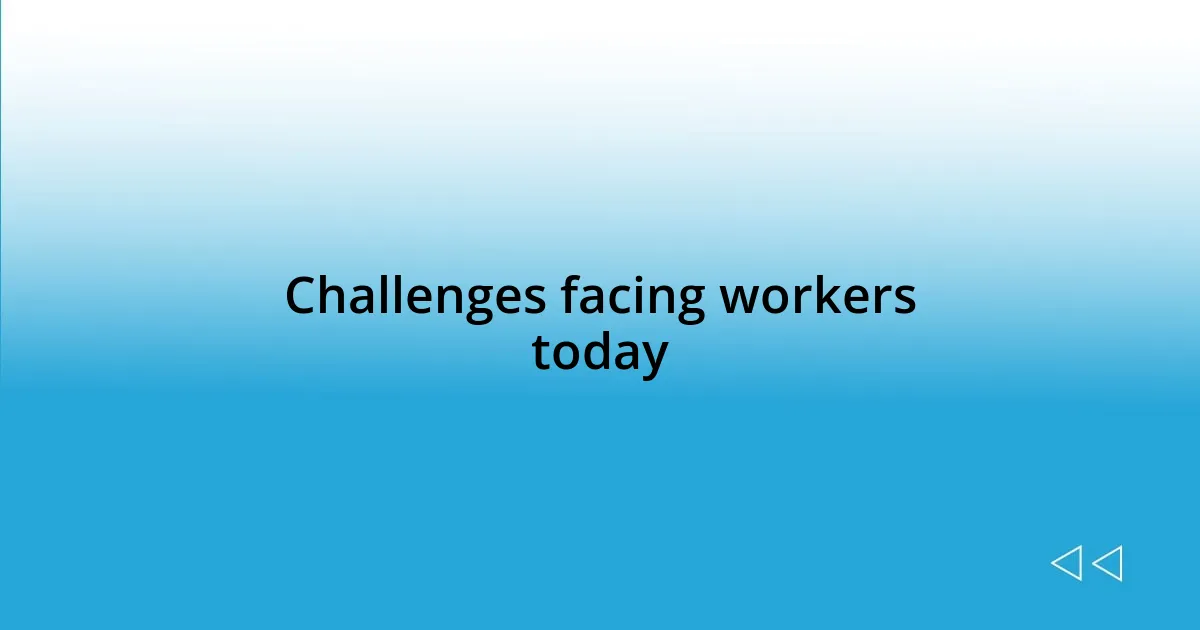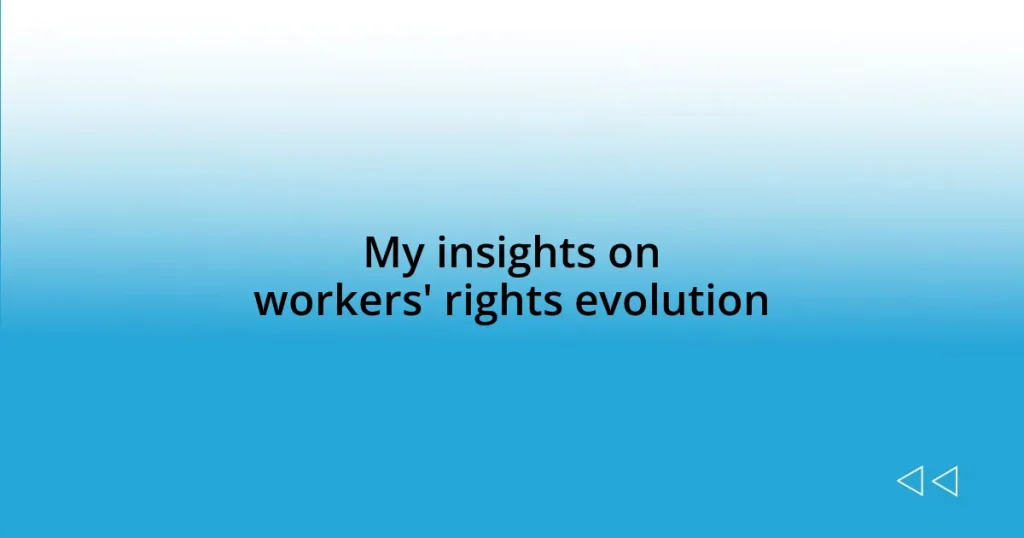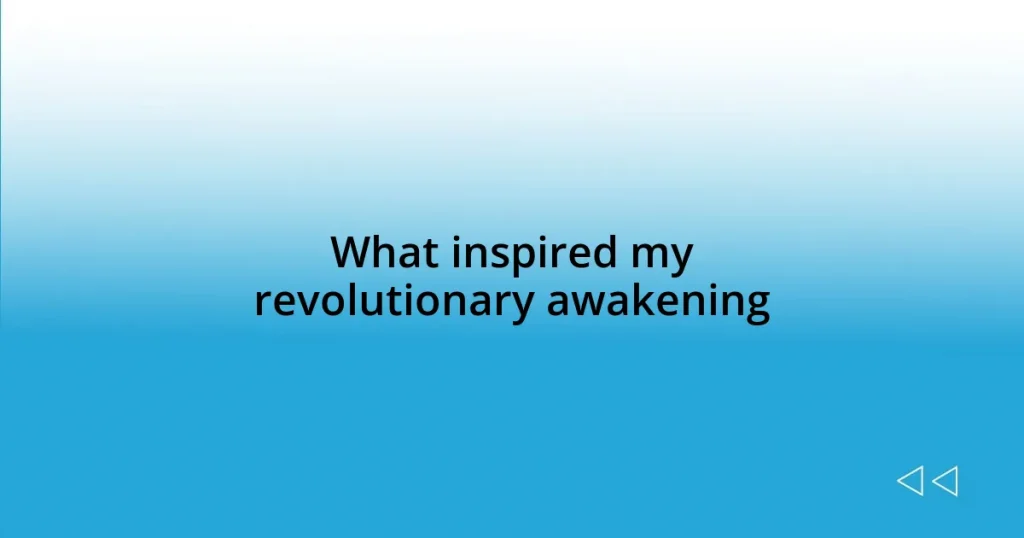Key takeaways:
- Establishment of the Fair Labor Standards Act (1938) set minimum wage and overtime regulations, marking a significant advancement in workers’ rights.
- The Civil Rights Act (1964) included provisions against employment discrimination, enhancing equality in the workplace.
- Late 20th century saw a growing focus on mental health and wellness, recognizing their importance for employee productivity and well-being.
- Emergence of remote work and gig economy jobs has introduced new challenges regarding job security and fair compensation for workers.

Understanding workers’ rights history
As I reflect on the evolution of workers’ rights, I can’t help but think about how far we’ve come from the grueling conditions of the Industrial Revolution. Imagine toiling away for hours in unsafe factories, where the mere concept of breaks was unheard of. It’s staggering to realize that those early struggles laid the foundational stones for the rights we often take for granted today.
One pivotal moment that stands out in my mind is the rise of labor unions in the late 19th century. These collective voices banded together to demand better wages and safer working conditions, often at great personal risk. Have you ever felt the strength that comes from unity? That sentiment surely propelled workers to stand up for their rights, igniting a movement that transformed labor laws and workplace standards.
Fast forward to today, and while we have seen significant improvements, the fight for equitable treatment continues. There are still countless workers facing challenges in areas like job security and benefits. It makes me wonder, what would those early labor activists think if they could see us now? Their bravery set the stage for our ongoing dialogue about what workers truly deserve.

Key milestones in workers’ rights
The establishment of the Fair Labor Standards Act (FLSA) in 1938 represents a significant turning point in the journey towards workers’ rights. It not only set a federal minimum wage but also introduced regulations about overtime pay. I remember learning about these historic muscle movements and appreciating how they paved the way for a balanced work-life dynamic that many of us enjoy today.
Another key milestone was the 1964 Civil Rights Act, which notably included employment discrimination provisions. This was a game-changer for many workers who faced unfair treatment based on race, color, religion, sex, or national origin. I often think about the brave individuals whose stories were magnified during this time—those who stood up against injustice and truly believed in equality. Their courage has deeply influenced my perspective on advocating for inclusivity in the workplace.
Most recently, the focus on mental health and wellness in the workplace cannot be overlooked. Advocacy for mental health days began gaining momentum in the late 20th century, acknowledging that well-being is an essential component of productivity. It amazes me to see how far we’ve come in recognizing that a happy employee is often the most productive one. It’s heartening to think about how the dialogue around mental health will continue to evolve, fostering environments where everyone feels valued and heard.
| Year | Milestone |
|---|---|
| 1938 | Fair Labor Standards Act established minimum wage and overtime pay |
| 1964 | Civil Rights Act included provisions against employment discrimination |
| Late 20th century | Growing advocacy for mental health and wellness in the workplace |

Current trends in workers’ rights
One fascinating trend I’ve noticed in the current landscape of workers’ rights is the rising popularity of remote work and gig economy jobs. Flexibility has become a key focus for many employees who now seek arrangements that better accommodate their lifestyles. I vividly recall the excitement of working from home for the first time; it felt liberating not to be bound by a traditional office setup. However, this shift also brings new challenges, like the need for clear boundaries and consistent pay, which are often absent in gig work.
- Increased focus on remote work and flexible hours
- Growing gig economy with non-traditional job structures
- Emerging conversations around fair compensation and benefits for gig workers
- Legislation aimed at protecting gig workers’ rights
Another noteworthy development is the rising awareness around workplace diversity, equity, and inclusion (DEI). Companies are being held accountable for fostering environments that respect all backgrounds. I remember a workshop I attended focused on understanding unconscious bias—it was an eye-opener. The sincerity in discussions about DEI illustrates a collective recognition that diverse teams lead to better outcomes. As we shift toward a more inclusive mindset, it feels rewarding to see the dialogue expand beyond mere compliance and into genuine cultural change within workplaces. The journey toward ensuring every voice is heard is one that deeply resonates with me and many others advocating for a more diverse workforce.
- Heightened accountability for workplace diversity and inclusion
- Focus on addressing unconscious biases in hiring and management
- Emphasis on creating supportive environments for marginalized groups
- Recognition that diverse teams drive innovation and business success

Challenges facing workers today
Many workers today face the daunting challenge of job security, especially in an economy marked by fluctuations and uncertainty. I often think back to experiences from my early career when I was let go without warning. It left me feeling vulnerable and questioning my worth in the job market. It’s concerning to see how many are navigating similar situations, highlighted by the rise of layoffs in numerous sectors. What does job security even look like anymore, and how can workers protect themselves?
Another issue is the struggle for fair wages. In a time when living costs are skyrocketing, many find their earnings don’t keep pace. I remember a conversation I had with a friend who juggles multiple jobs just to make ends meet—it’s a reality that should not have to exist. Workers often wonder, “Why is it that after years of hard work, I still can’t afford a decent living?” This ongoing battle for equitable compensation leads to disillusionment, impacting morale and overall productivity.
Furthermore, the conversation around workers’ mental health remains critical. Though we’ve made strides in acknowledging its importance, many still feel pressure to hide their struggles at work. I’ve experienced the heavy burden of feeling like I had to put on a brave face, even when I was struggling internally. This makes one wonder how many potentially brilliant ideas and talents are lost because people are simply too exhausted or stressed to participate. It’s imperative for workplaces to foster environments where vulnerability is not met with judgment but with support.

Future of workers’ rights movement
The future of the workers’ rights movement seems to be heading toward a more intersectional approach. As someone who has navigated various workplace dynamics, I believe that understanding how different aspects of identity—such as race, gender, and socioeconomic status—interact is crucial. This shift encourages a broader spectrum of voices to be heard, which can only enrich the conversation around workers’ rights. I often reflect on how my unique experiences shaped my perspective, and I’m excited to see a movement that welcomes more diverse narratives.
Additionally, I see technology playing an essential role in shaping future advocacy for workers. With the rise of social media, workers now have platforms to voice their concerns and mobilize support more effectively than ever. It reminds me of a time when I shared my struggles in a forum and was overwhelmed by the wave of solidarity from others who felt similarly. This sense of community can drive change, pushing organizations to prioritize fair practices. The burgeoning use of apps and platforms dedicated to worker rights is a testament to how we can leverage technology for advocacy.
Lastly, the conversation around mental health in the workplace is becoming more pronounced, and I believe it will be a keystone in the future of workers’ rights. It’s no longer just about hours and wages; it’s about creating a culture that prioritizes well-being. I remember when I first initiated a conversation about mental health in my workplace. The openness that followed was liberating, affecting productivity and morale positively. As we move forward, I’m hopeful that mental health support will no longer be an afterthought but a fundamental aspect of workers’ rights. After all, how can organizations expect peak performance if their employees are not supported holistically?
















